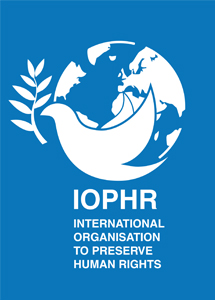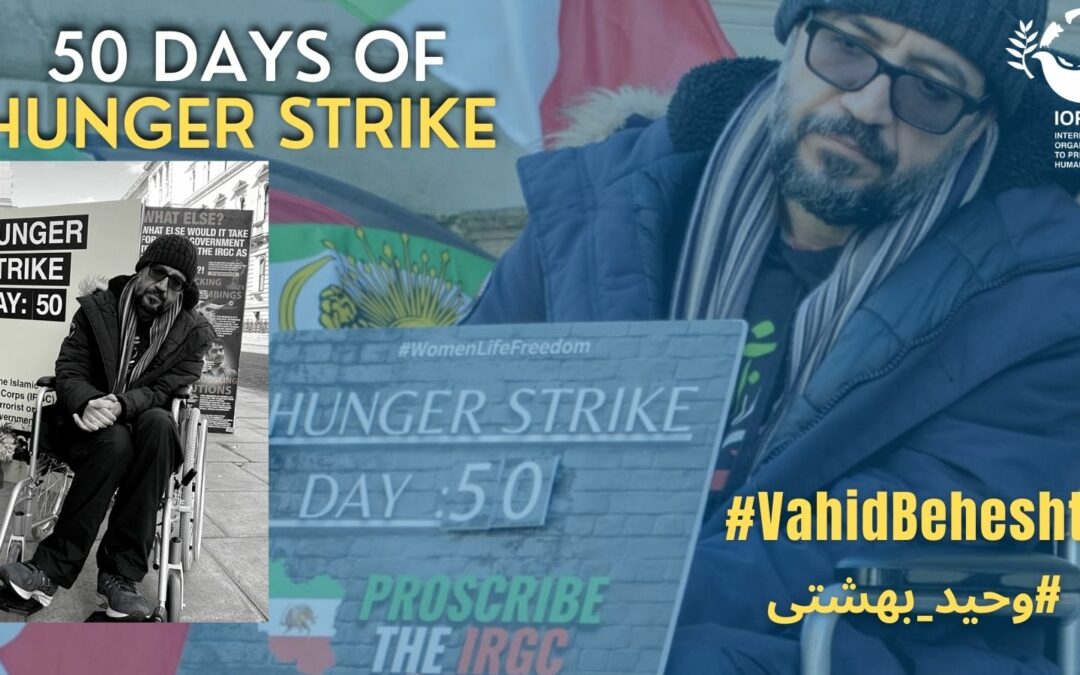Dear Member of Parliament,
13 April 2023 – As of today, 50 days have passed since Mr. Vahid Beheshti began his hunger strike and sit-in protest in front of the headquarters of the British Ministry of Foreign Affairs in White Hall, London.
Mr. Vahid Beheshti has taken this brave and selfless action in order to ensure that the legal process of including the name of the Islamic Revolutionary Guard Corps in the list of terrorist organisations of the British government is realised. As the process of proscribing the IRGC seems to have come to a sudden and mysterious halt.
IOPHR, in this letter, would like the Members of the UK Parliament to urge the UK Government to implement the views of a large section of the general public who are endangered by the threats posed by the IRGC, and also the views of the majority of MPs, who on 12th January, in a non-binding vote, asked the UK Government to proscribe the IRGC.
As the Members of the UK Parliament know full well, the IRGC is an extremist organisation that has for years, threatened British citizens and British democratic values. The IRGC is one of the largest state-sponsors of terrorism in the world, and is responsible for founding, training, and supplying Hezbollah, a group designated as a “Foreign Terrorist Organisation” by the United States Department of State, and is also responsible for supporting Hamas, a group already proscribed by the UK. Moreover, the IRGC is guilty of kidnapping & executing journalists & dual nationals, including the assassination of journalists & activists outside of Iran, and responsible for supplying arms and drones to Russia, which Russia then uses in its attack on Ukrainian civilians. Furthermore, the IRGC as stated by the most recent MI5 report, is active in the UK, and is responsible for at least 20 plots against Iranian activists since 2022. More recently, the freedom of speech and freedom of the press was violated when Iran International media group was forced to relocate from London due to a direct threat to life from the IRGC.
The recent bipartisan open letter from 130 Members of the United States Congress to Josep Borrell Fontelles, the EU High Representative for Foreign Affairs and Security Policy, gives more insight into the serious risk that the IRGC poses on Europe’s safety and security, including at least 33 plots to surveil, abduct and assassinate citizens in Europe.
As Mr. Beheshti has stated in numerous open letters to the UK Prime Minister, there are no good reasons for the IRGC not to be proscribed. But sadly, despite the views of the Members of the UK Parliament, the UK Government has come up with an ever-increasing array of excuses not to follow the wishes of the MPs in its non-binding vote, rather than facilitate the proscription.
Therefore, in this letter, IOPHR would like to officially respond to some of the common justifications mentioned for not proscribing the IRGC.
Justification 1: The IRGC is part of the Iranian military and thus can’t legally be proscribed
IOPHR would like to point out that the IRGC and the ruling system of Iran is unlike any other nation within the UN, as it is a system with two levels of government structures – Upper and Lower level of government. The lower level of government is what the former president of Iran interpreted as a ‘procurer’, whose main task is to manage Iran’s material and human resources in order to implement the agenda of the upper level. The lower level is used as an “external face” as a way to deceive the world, and hide its true agenda. The upper level is the one that is managed by the ‘jurisprudence’. Each of the institutions and organisations that exist at the lower level, have a counterpart at the upper level. In all these cases, the upper-level institutions are managed by the Supreme Leader, Ali Khamenei. In the Iranian Constitution, the IRGC is given the responsibility for “defending the revolution around the world” and has no constitutional duty to defend the country or the people of Iran. It is unsurprising that even the name of Iran is not mentioned in the IRGC’s name; contrarily, the official name of the army within Iran is called the Islamic Republic of Iran Army. According to the internal laws of Iran, including the Constitution, the duty of protecting the political borders of the country of Iran is entrusted to the Islamic Republic of Iran Army and the mission of preserving and expanding the development goals of the Islamic Revolution is entrusted to the Islamic Revolutionary Guard Corps. Also, considering the fact that the IRGC have actively participated in hundreds of terrorist operations around the world, they are consequently a terrorist militia organisation and can never be considered as a regular national army. This means that the IRGC’s field of activity is defined by the highest level of government around the world, unlike the army, whose task is to protect political borders.
Justification 2: Proscribing the IRGC will lead to the closure of the UK Embassy in Iran and will prohibit communications between the UK and Iran
After the attack on the UK embassy in Iran in 2011, UK removed its ambassador for three years and yet none of this stopped the diplomatic processes behind closed doors on the nuclear issue, and the embassy was formally opened a year before the 2015 Agreement was signed. Moreover, the United States has had no embassy in Iran for over 40 years, and yet this has not been an issue for its negotiations with Iran on its nuclear program, nor for its negotiations for the release of US hostages in Iran.
Justification 3: Proscribing the IRGC will thwart negotiations on the Iran’s nuclear program
In response to this doubt, IOPHR would like to point out that the ruling Regime in Iran has repeatedly violated the nuclear agreements reached since 2003, and each time, in response to these violations, the Western governments have been forced to renegotiate and reach another agreement. This failed strategy has allowed the Iranian Regime’s nuclear program to progress from less than ten percent enriched nuclear material in 2003 to more than ninety percent in 2023. Western governments must come to a realisation that the Iranian Regime is only playing for time, and the only thing it will respond to is a strong position taken by the West. Otherwise, the Iranian Regime will continue its relentless progress towards a Nuclear Iran in a stealth manner, as shown by IAEA reports.
Justification 4: Proscribing the IRGC will prevent negotiations on the release of UK citizens held hostage in Iran
It is important to first note that one of the IRGC’s main policies is taking hostages. The issue of the UK Government’s hostage negotiations with the IRGC-backed groups, dates back to when Mr. Terry Waite, a British citizen and human rights activist, was taken hostage by the forces under the command of the Islamic Revolutionary Guard Corps in 1987. If four decades ago, the western governments did not submit to the IRGC’s hostage-taking policy and did not give them legitimacy through negotiations with this criminal organisation, would other UK citizens be held hostage by the IRGC today? Moreover, none of these so-called hostage negotiations were able to save the life of British-Iranian national Alireza Akbari, who was executed in January 2023. It is, therefore, the policy of appeasement and friendship with criminals such as the IRGC that endanger the safety and security of UK citizens.
Justification 5: Sanctions are just as effective as proscribing the IRGC
It is important to realise that the sanctions that have been placed by the British Government lack the necessary effectiveness, as they are aimed at individuals who will, in all likelihood, never leave Iran. Therefore, the most effective way to halt or to curtail the IRGC’s activities within the UK is to proscribe them. This crucial action will not only prohibit or thwart funding and other activities of the IRGC in the UK, but will also create an international barrier for all the companies who currently trade with the Iranian Regime and UK companies. Consequently, each of these companies will have to choose between trading with Iran or the UK. This will also extend the international pressure on the IRGC and the Iranian Regime to abandon their extremist policies, and yield to western demands; as well as help the millions of oppressed Iranian citizens by weakening the Iranian Regime’s ability to fund its activities within Iran and abroad.
Given the above responses to these old justifications, IOPHR would like to request the Members of the UK Parliament to urge the UK Government to finally proscribe the IRGC. Each day that passes without doing so, not only endangers the life of ordinary British citizens, but also poses a danger to the life of a brave human rights activist and journalist, Vahid Beheshti, who has risked his life to protect British democratic values and freedoms.
Vahid Beheshti’s GP, who has been monitoring his health over the last 7 weeks, has expressed serious concerns about his current health condition – Mr. Beheshti has lost more than 17% of his body weight, and due to his current symptoms, has been advised by his GP to use a wheelchair to and from public facilities. Due to increasing concerns over Mr. Beheshti’s fragile state, his GP has sent an open letter to the Prime Minister and the Foreign Secretary on 13 April 2023, explaining his worries as a physician.
Accordingly, IOPHR requests the Members of the UK Parliament to put pressure on the British Government to proscribe the IRGC as soon as possible, before Vahid Beheshti’s health suffers irreversible harm. In addition, IOPHR requests Prime Minister Rishi Sunak to honour his own pledges from before becoming Prime Minister, and place the IRGC on the list of terrorist organisations.
IOPHR would also like to request the Members of the UK Parliament to visit Vahid Beheshti opposite the Foreign, Commonwealth and Development Office, and urge the Foreign Secretary as well as the Prime Minister to do the same, as Mr. Beheshti is risking his well-being to advocate for human rights, the protection of free speech, freedom of press and the safety and security of Great Britain.
International Organisation to Preserve Human Rights (IOPHR)
London, Brussels, Berlin, Toronto, Washington
13th Apr 2023

